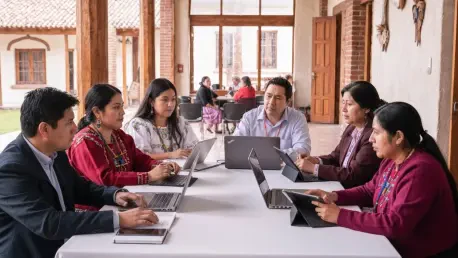In a world increasingly shaped by artificial intelligence, the ethical implications of this transformative technology are under intense scrutiny, and Ecuador stands at a critical juncture in navigating this complex landscape. The recent release of a comprehensive assessment by the UNESCO Quito Office has shed light on the nation’s preparedness to align with global standards for ethical AI governance. This pioneering report, crafted through extensive stakeholder engagement, evaluates how well the country can integrate principles of human rights, inclusion, and sustainability into its AI ecosystem. It highlights a nation with promising early commitments but also significant hurdles to overcome. As AI continues to influence sectors from healthcare to education, understanding Ecuador’s strengths and gaps offers valuable insights into the broader challenges of building technology that serves humanity responsibly. This evaluation not only marks a significant milestone for the country but also sets a precedent for others striving to balance innovation with ethical considerations.
Building a Foundation for Ethical AI
The journey toward ethical AI in Ecuador has gained momentum through a structured and inclusive diagnostic process spearheaded by UNESCO’s Readiness Assessment Methodology. Launched in late 2024, this initiative involved a series of 10 national consultation workshops, engaging 91 stakeholders from diverse sectors including government, academia, and civil society. Key institutions such as MINTEL and SENESCYT played pivotal roles in shaping a holistic view of the national AI landscape. This participatory approach ensured that varied perspectives were considered, laying the groundwork for a robust framework. The emphasis on collaboration reflects a growing recognition of AI’s potential to drive progress, provided it is guided by shared values. By identifying regulatory and technical gaps, the assessment serves as a critical tool for policymakers to prioritize actions that align with international ethical standards, positioning Ecuador as a proactive player in the global conversation on responsible technology development.
Equally significant is the country’s early alignment with UNESCO’s global framework for ethical AI, adopted by 193 Member States. The establishment of an Artificial Intelligence Committee in 2024 marks a concrete step toward institutionalizing these principles. Alongside this, efforts to draft a policy for ethical AI use demonstrate political will to address emerging challenges. Growth in open data availability and public discourse on regulation further indicate a maturing ecosystem. Additionally, advancements in gender parity within STEM fields and improved urban connectivity are positive indicators of inclusivity. However, while these developments are encouraging, they represent only the initial stages of a broader transformation. The challenge lies in sustaining this momentum and translating commitments into actionable outcomes that bridge existing divides and ensure technology benefits all segments of society without exacerbating inequalities.
Navigating Persistent Obstacles
Despite early progress, Ecuador faces substantial barriers in achieving a cohesive and ethical AI environment. A primary concern is the absence of a unified national AI strategy, which remains under development. This gap has led to fragmented efforts and limited coordination among stakeholders, hindering effective implementation of ethical guidelines. Infrastructure disparities compound the issue, with only a small number of data centers available—far below the global average per capita. Connectivity remains uneven, with urban households significantly more likely to have internet access compared to rural ones. Such disparities risk deepening digital divides and excluding vulnerable populations from the benefits of AI. Addressing these structural challenges requires not only investment in physical infrastructure but also a strategic vision that prioritizes equitable access as a cornerstone of technological advancement.
Beyond infrastructure, gaps in education and diversity pose additional hurdles. Training in AI ethics remains scarce, with very few academic programs focusing on the intersection of technology and ethical considerations. This shortage limits the development of a skilled workforce capable of navigating the moral complexities of AI systems. Furthermore, there is a notable lack of mechanisms to ensure diversity within AI development teams, which can lead to biased algorithms that fail to represent the nation’s varied demographics. Environmental impacts of AI technologies are also underexplored, with insufficient frameworks to assess sustainability. Tackling these issues demands a multifaceted approach, integrating education reform, policy incentives, and cross-sector collaboration to foster an AI ecosystem that is both innovative and inclusive, ensuring no community is left behind in the digital transformation.
Charting the Path Forward with Strategic Recommendations
To address the identified challenges, the assessment consolidates a series of actionable recommendations, with several prioritized as high importance. Key among them is the development of a comprehensive legal framework for AI that aligns with data protection and digital rights. Establishing multi-stakeholder governance structures is also critical to ensure coordinated efforts across sectors. Fiscal incentives for ethical AI innovation could spur private sector involvement, while integrating a gender perspective into policies would promote inclusivity. Enhancing digital infrastructure, particularly in rural areas, remains a pressing need to close connectivity gaps. Additionally, promoting algorithmic transparency through a national repository of public algorithms could build trust and accountability. These targeted strategies aim to create a robust foundation for AI that supports sustainable development while addressing systemic inequities prevalent in the current landscape.
Reflecting on the strides made, the detailed analysis provided a balanced view of achievements and shortcomings, revealing a nation at a pivotal moment in its technological evolution. The commitment to ethical principles was evident through initial policy drafts and stakeholder engagement, yet the path ahead demanded unified action. Looking back, the focus was on laying out implementation roadmaps during public events that followed the report’s release. These discussions were instrumental in shaping a national strategy aligned with global sustainability goals. Moving forward, ongoing collaboration across sectors must prioritize bridging infrastructure gaps and embedding inclusivity in governance. By focusing on these actionable steps, Ecuador can harness AI’s potential for human-centered innovation, setting an example for others in the international community striving for ethical technological progress.









